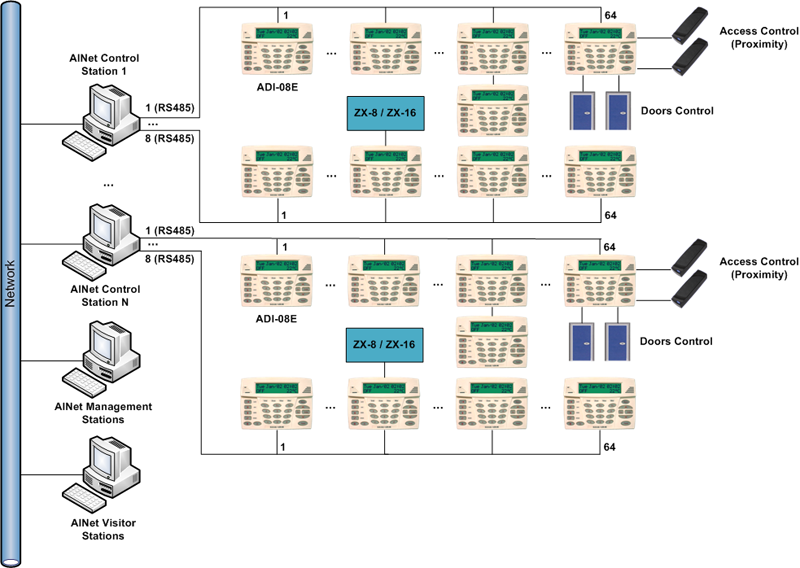|
|
AlNet-2007 System
Architecture:
The AlNet-2007 System comprises of a Monitoring&Control center essentially a set of PCs with one or
multiple RS-485 communication adapter(s), running our AlNet Control software and multiple ADI-08 Stations, each a
fully functioning Alarm/Access Control Panel.
 Instant Price Quote for AlNet-2007 System Instant Price Quote for AlNet-2007 System

Up to 64 ADI-08 or ZX-8 Stations can be connected to a single RS-485 data loop, in a multi-drop
configuration (star configuration is also permissible for short range systems). Up-to 8 RS-485 ports can be connected
on a PC - for a total of 512 Stations per one PC.
Up to 8 ADI-08 and/or ZX-8 Stations can be grouped together in a "Cluster" forming a single Alarm Panel
of up to 64 zones. The number of "Clusters" and the number of stations in each "Cluster" has no
additional limitations (all members of a "Cluster" must reside on the same RS-485 loop). Get More Info
Communication:
Stations are connected to the Central via 2 wires for communication + 2 wires for power (optional).
Stations can be located at large distances from the Central - standard at up to 1500 meters, double with RS-485
Repeaters. A continuos two-way data communication is performed for each RS-485 loop - all loops running in parallel.
A fast scanning data rate (19,200 bits/sec) allows for a complete round on all possible Station of less than 3 seconds
(fully loaded system - for less stations, round time is shorter). On each scanning round, each station - in
response to an addressed request from the Central PC - transmits an update of its current status, complete with
information on all inputs state, and panel operation mode info. All new events (e.g. Arm/Disarm, Alarm, etc..) are
also transmitted on each round. The system operator has a real time view of the status of all Stations inputs and
operational mode - updated every round cycle time (less than 3 sec. for max. loaded system).
The two-way fast communication handles the following additional functions:
- Complete remote control of each Station operation (under multi-level password supervision), including Arm/Disarm, Bypass Zone(s).
- Remote On/Off control of each Station Control Outputs.
- Station parameters download, modification and upload (e.g. inputs names and definitions, timers setting, Station operation modes, etc.) from the Central, all under multi-level password supervision.
- Complete remote update of any station Firmware (for versions update, language change, features adding, etc.)
Get More Info
The Central:
A PC, equipped with RS-485 Interface(s) comprises the Central Hardware. Up to 8 RS-485 interfaces can be
installed, each handling a maximum of 64 ADI-08E Stations - all controlled by the AlNet-2007 Control
software. Output data can be provided (via RS-232 port(s)) for our Multi-User WinGal98 Automation
software, and/or to a special modem for Events report to a Remote Central, using the standard Contact-ID protocol.
The AlNet-2007 Software features:
- General-View screen, allowing an overall status display of all Stations on one screen: each Station
has a designated color-coded square, including its name and the status (represented by a specific color):
Off, Armed-Stay, Armed-Away, In-alarm, Not-responding. Any high-priority event from a Station (e.g. Alarm,
Panic, etc.) will be presented with a "blinking" Station square, to be reset after Operator acknowledge.
- Incoming Events screen: each Event is displayed with a date/time stamp, Event description including
User/Operator name (where applicable), Station description (name, location). The Event is color-coded
reflecting its priority.
- Two level graphical description (map) for each Station:
- Floor level with flashing Icon for Stations in Alarm/Emmergency.
- Protected site level, with color coded Icons for each Zone reflecting its Real-Time status:
In Restore, In Alarm(flashing), Alarm Memory. Alarm Memory can be cleared manually or
automatically on System Disarm.
- A Station (or Cluster) can be individually chosen for detailed real-time status display including:
- Zones state (Open, Restore, Trouble).
- System operation mode (Off, Armed Stay/Away, In-Alarm, Panic/Fire/Medical, Ready to be armed, Tamper state, etc.).
- Siren&Remote Control Outputs state.
- Station (cluster) last Events (scrollable Log history screen) - updated in real-time
- Analog data (Station voltage supply, Inputs analog data, Temperature)
- The following Remote Control operations can be carried out for each Station (or cluster) - each
with its special authorization (by operator) with a password:
- System Arm Away/Stay.
- System Disarm.
- Zone Bypass.
- Outputs control (Siren, Microphone, General purpose).
- Station modifiable Parameters can be downloaded, modified and then re-loaded (uploaded). These
include:
- names of zones, users, outputs;
- zones operating mode (for each system state);
- General Operating modes (e.g. Short Arm, Silent Panic, Remote Disarm enable, etc.);
- Timers/Delays;
- Supply status report levels, etc.
- Complete or partial Firmware update of any Station. Enables versions update, language replacement, new
features, etc. - all remotely updated from the Central.
- Assistance for Real-time Events handling by the operator:
- Open Events list, automatically updated by incoming Alarm Events Manual Event closing by the operator.
- Operator handling log, with automatic/manual handling description.
Handling Log includes date/time stamp, as well as operator ID.
- Management functions including:
- Creating new Stations (clients) - Name, Station ID, Place, Graphic data.
- Updating parameters to existing Stations.
- Creating Station Clusters.
- Extensive Reports facility (on-line).
Get More Info
Screenshots:
Get More Info
Applications:
- Shopping Malls.
- Residential Condominiums.
- Office Buildings.
- Army Camps.
- University Campus.
- Airports.
- In general: where a large number of distant individual Alarm Systems can be controlled
from a manned Central location.
|
|

